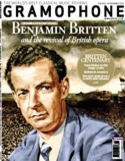Texte paru dans: / Appeared in:
*

GRAMOPHONE (11 /2013)
Pour s'abonner /
Subscription information
Decca
4785336

0028947853367 (ID326)
Reviewer: David Vickers
Fasiolis leads
further Steffani explorations from Bartoli, I Barocchisti and others
The proclamation that Cecilia Bartoli ‘continues her Mission to discover the
music of Agostino Steffani’ might lead an unsuspecting public to assume
nobody of note has recorded Steffani’s Stabat mater before, but the
celebrated work sent by the composer in 1728 to London’s recently founded
Academy of Ancient Music has been recorded eminently by Gustav Leonhardt (DHM)
and Harry Christophers (Coro). Bartoli sings little during this 73-minute
collection – and her contributions are the weakest link. It seems odd to
assign the star diva’s pinched vowels and restrained timbre to the simple
plaintive introduction (‘Stabat mater dolorosa’) instead of a member of the
choral ensemble. Franco Fagioli sings in the same unbridled way in his brief
solo ‘Quis est homo’ (in fact, it’s hard to tell the countertenor and
Bartoli apart); Daniel Behle and Julian Prégardien are clumsy in the tenor
duet ‘Inflammatus et accensus’. This anachronistically over-egged
performance is exacerbated by an overpoweringly loud choir and adds up to a
strange kind of pseudoBaroque Rossini rather than the stile antico
intimacy and contrapuntal refinement Steffani’s music cries out for. Diego
Fasolis presents six other shorter works, most written for Munich early in
Steffani’s career: the Choir of Radiotelevisione Svizzera is disciplined in
the concise yet impressive eight-part Beatus vir and short antiphon
Triduanas a Domino but the brass doubling is a fiction invented by
Fasolis. Bartoli returns to centre stage for a garish performance of the
motet Non plus me ligate.
Cliquez l'un ou l'autre
bouton pour découvrir bien d'autres critiques de CD
Click either button for many other reviews


